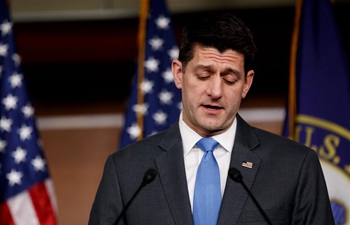by Xinhua writers Wang Ping, Miao Zhuang
CHICAGO, April 12 (Xinhua)-- Rick Kimberley has been growing soybeans and corn for more than 40 years on the vast tracts of farmland in the northeastern part of Iowa in the United States.
Should a 25 percent import tax be imposed on his soybean, of which one third of annual output is exported to China, he would have to give up the business on which he had depended on for a living.
Home to a large portion of America's pork and grain products, Iowa is the second largest agricultural state after California. Its annual outputs of pork, egg and corn have long topped nationwide rankings.
"If we do have a trade war, the market will probably go down and that will affect my income as well as many other soybean producers. We have to change the acreage of the crop," Kimberly said. Assisted by another two engineers, Kimberly was fixing his planter in a cottage on his farmland.
As the spring planting season approaches, Kimberly is awaiting the frost to melt so that he can sow the corn and soybean seeds across the 4,000-acre (16 square km) farmland that he owns.
The U.S. administration last Tuesday proposed a list of products to be subject to a 25 percent import tariff, which will be imposed on Chinese exports worth 50 billion U.S. dollars.
Within several hours the unilateral move was met with China's proportional retaliation. Beijing said it will levy a 25 percent duty on 50 billion dollars' worth of U.S. products including soybeans, automobiles and chemical, among others.
"We are watching the market, if the trend keeps going like this, maybe we will have some adjustment," Kimberly said.
China is the world's biggest buyer of U.S. soybeans, having imported a total of 27.5 million tons of them in 2017, according to the U.S. Department of Agriculture. In money terms, it represents an approximately 14-billion-dollar business annually.
"If there were increased trade tensions, soybeans could likely be a powerful target in any Chinese retaliation," said Paul Burke, North Asia regional director for the U.S. Soybean Export Council.
That's a big worry for an industry that supports tens of thousands of jobs in the United States.
"China is our number one market and our most important market," Kimberly's son Grant said, adding that the Iowa Soybean Association, of which Kimberly Jr is the marketing director, has had "long-standing relationships" with China since 35 years ago when it established its China office.
"We were disappointed to see that these actions have been taken. Of course we did not want to see any kind of trade disruptions," he said about U.S. President Donald Trump's intimidatory tariff punishment.
Kimberley Jr said U.S. farmers are very concerned about the negative impacts brought about by the looming trade war, which he said "would make things worse" since the U.S. agriculture sector is already in a downturn trend.
"It already has a negative impact. We've already noticed that soybean prices have dropped from where they were about a month ago, that's partially due to trade war fear," he said.
If prices remain weak, Kimberly Jr said, farmers will have to abandon soybeans and instead grow other types of crops this spring.
Both Iowa State and U.S. agricultural officials have warned the White House about the negative implications of the proposed sanctions for the soybean industry. In just five years, farm income in the United States has declined 50 percent while crop prices have dropped 40 percent, according to data provided by American Soybean Association (ASA).
The ASA, a 95-year-old trade organization which boasts of representing 21,000 soybean producers across the country, cautioned that "retaliation by China will cost farmers their livelihoods," voicing criticism of Trump's tariff decision.
"Farm incomes are down nearly 50 percent from 2013. There is a real struggle in agriculture to keep everything going right now. It's extremely frustrating to have the administration taking aim at our largest trading partner," it said.
The soybean industry is by no means the only one that falls victim to the U.S.-China trade frictions. Many other fields in the U.S. agriculture sector suffer as well.
Jim Heimerl, president of the U.S. National Pork Producers Council (NPPC), said higher tariffs on Chinese imports will in turn harm U.S. producers and undermine the country's rural economy.
"No one wins in these tit-for-tat trade disputes, least of all the farmers and the consumers," said Heimerl.
"China is a very important market for U.S. pork producers. In 2017, China was the second largest U.S. pork export market by volume and the third largest export market by value," said Jim Monroe, senior communications director of the NPPC. The U.S. pork industry exported 1.1 billion dollars of products to China last year.
Moreover, Trump's tariff proposal also stoked fear among U.S. wine producers, who said they are concerned about the potential backlash from Chinese consumers.
"There could be (a) push back by Chinese consumers deciding to buy wines from other countries," said Michael Parr with Wente Family Estates, a California based winery.
Exports of American wine, 97 percent of which is produced in California, to China have increased 450 percent in the past decade. Last year alone, sales of American wine in Chinese mainland and Hong Kong were up 10 percent year on year, bringing in an additional 197-million-dollar revenue to American vintners.
According to U.S. Department of Agriculture, American farmers exported about 22 billion dollars' worth of agricultural products to China in 2017, making agriculture a major source of surplus in bilateral trade.
"We do not want to be casualties of trade war, and we want to be stable soybean suppliers to Chinese customers, providing them with high quality protein." Kimberley said.













